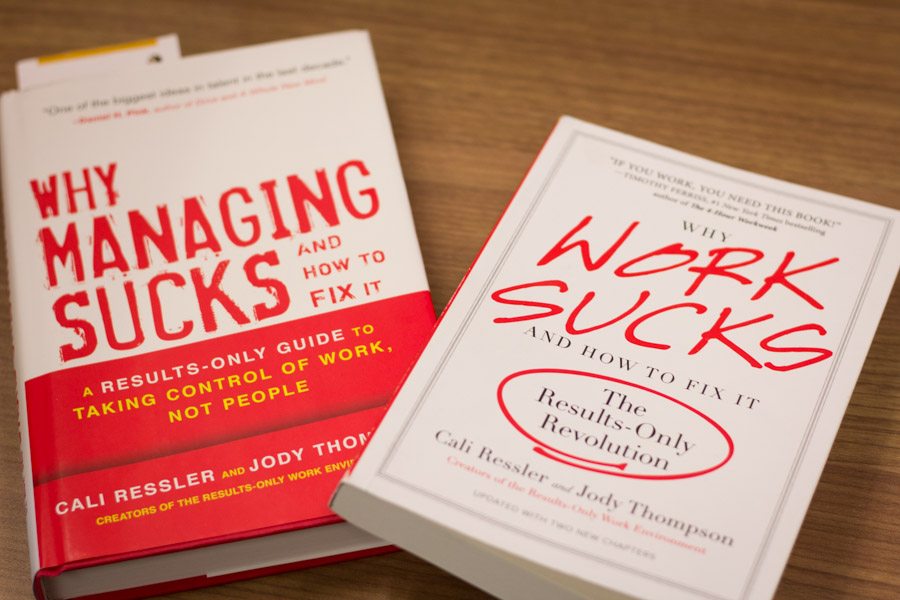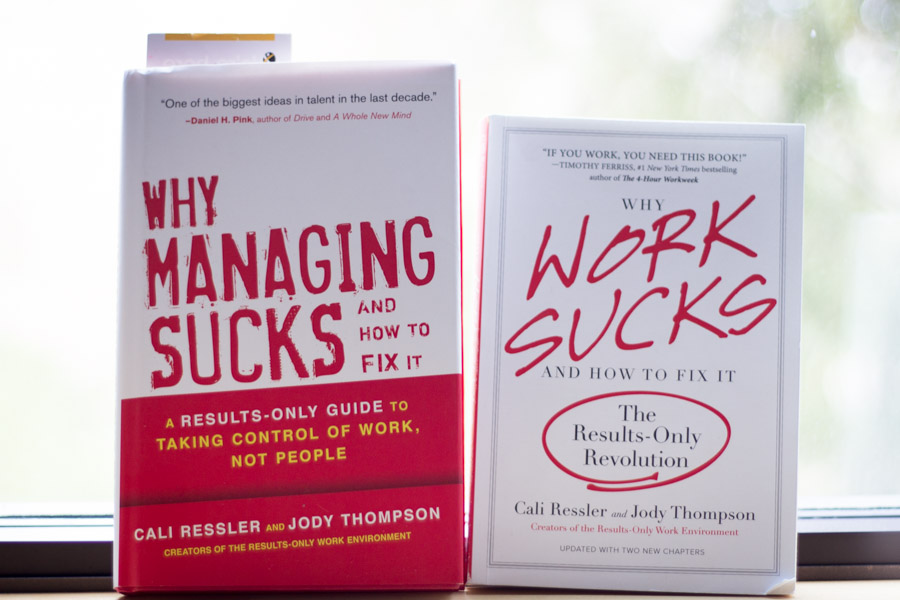Support this Show
Subscribe on your favorite podcast app (iTunes, Stitcher, Google Play, etc.)
Review us on iTunes
Take our survey and we’ll enter you in a drawing for a free book
Follow Xenium HR on Twitter and LinkedIn and Brandon Laws on Twitter and LinkedIn
![]()
Brandon: Welcome to the HR for Small Business Podcast, this is your host Brandon Laws. Today I’m with Jody Thompson, co-author of the books Why Work Sucks and How to Fix It: The Results-Only Revolution and Why Managing Sucks and How to Fix It: A Results-Only Guide to Taking Control of Work, Not People.
Jody is also the co-founder, along with her business partner Cali Ressler, of Culture RX and they co-wrote these books together. Jody, it’s great to have you! Thanks for making time.
Jody: Hey, Brandon. I’m glad to be here with you today.
 Brandon: So I’ve got to admit, I had your books both sitting on my desk and the titles stick out quite a bit. A co-worker swung by and saw Why Work Sucks sitting on my desk and I think they did a double take and kind of looked at me like, Oh, is this really how you think about work?
Brandon: So I’ve got to admit, I had your books both sitting on my desk and the titles stick out quite a bit. A co-worker swung by and saw Why Work Sucks sitting on my desk and I think they did a double take and kind of looked at me like, Oh, is this really how you think about work?
But I think for people who have actually read the book and know what your content is all about, they would totally get what you’re trying to say which is that the model that we’re currently in, in the work environment and how people are working, it’s an old model. So you’re suggesting this results-only work environment, and that’s what the book is all about. Why Work Sucks is really a manifesto based on the results-only work environment.
For listeners, if they’ve never read the book, what’s the results-only work environment? Because honestly, the first time I had heard about it was when I read the books.
Jody: People see that work sucks piece and they want to say, Well, gee. My job doesn’t suck. I mean, I really like what I do. But what we’re trying to say is it’s how people are forced to do the work that really sucks. What people want is to have control over their time and in the current workplace, people don’t have control over their time. It’s managers who have control over people’s time.
 So what really sucks is that we have to ask permission like naughty children every day to do the things that we want to do in our lives. Like maybe we want to work in a different location or we want to leave at a different time during the day or we just want to do our work differently and we feel like naughty children that are going to steal candy. We have to ask permission to do different things in different ways and it really makes it difficult for us to manage all of the things in our lives in a way that would make sense or let us use our common sense. So the workplace is really old-fashioned today.
So what really sucks is that we have to ask permission like naughty children every day to do the things that we want to do in our lives. Like maybe we want to work in a different location or we want to leave at a different time during the day or we just want to do our work differently and we feel like naughty children that are going to steal candy. We have to ask permission to do different things in different ways and it really makes it difficult for us to manage all of the things in our lives in a way that would make sense or let us use our common sense. So the workplace is really old-fashioned today.
In a results-only work environment, what that means is each person is 100% accountable and 100% autonomous. Now Brandon, when I say that, what I mean is autonomy is not flexibility. Flexibility is when I am asking permission to do something different than 8:00 to 5:00 Monday through Friday. I’m asking permission of somebody to leave early or come in late or tele-work or do one of those old-fashioned, silly things from the 20th century.
What autonomy is, is I am self-governing and independent. I’m making decisions on where I need to be and when I need to be there to get results, measurable results that I have agreed upon with my results coach or what used to be called a manager in the olden days.
I might be a bus driver or I might be a zookeeper or I might be a call center worker or a retail worker. I might have to be in a certain location at a certain time. I do that to get my job done. So results-only work environment is for every single person in every role, no matter where you are, if you do work, you can be in a results-only work environment. We’re not children, we can be accountable and autonomous. That’s a results-only work environment.
![]() Brandon: So why are businesses, HR leaders, you name it, why are we all throwing around that naughty F word so often? Flexibility. Employers seem to be offering flexibility as a benefit, but I think you’re kind of seeing the opposite, it’s like employees are asking permission. How do we get over that hurdle? We’re using flexibility so much in today’s work environment.
Brandon: So why are businesses, HR leaders, you name it, why are we all throwing around that naughty F word so often? Flexibility. Employers seem to be offering flexibility as a benefit, but I think you’re kind of seeing the opposite, it’s like employees are asking permission. How do we get over that hurdle? We’re using flexibility so much in today’s work environment.
Jody: Well, it’s so funny too because the flexibility thing, people are calling that innovative. That just makes me laugh because Kellogg Company started altering their schedules back in the 1930s. I mean come on, it’s 2017 and we’re saying, Oh, look at how innovative we are. We’re offering our people flexible work schedules. Give me a break! What flexibility is, again, is not giving people more control over their time, but managers more control over people’s time and it creates a hostile work environment. You probably read about that thing in the book, Brandon, called sludge.
Brandon: Oh, yeah. I was going to ask you about that!
Jody: What happens when you create flexibility in the workplace is it just makes sludge really strong in the work environment. It makes that language where people say, Oh, I wish I could leave early every day. Look at those people with kids leaving early and coming in late. It makes people talk about how other people are spending their time. It’s that culture of entitlement instead of opportunity.
So people are all looking at who’s getting more than I have. We’re not really focused on the work, we’re focused on the labels of people, the teleworkers, the remote workers, the flexi flex workers or whatever labels we’re putting on people.
 That’s what flexibility is, it’s just a way to control people more and it’s about where people are working from, so work location and work time, how many hours people are working. We’re really focusing on the irrelevant pieces of work, instead of getting everybody really rallied around what is the work and what is the measure of the work and holding people accountable to that. We’re holding people accountable to time and location and then that’s creating all the hostility because we think some people are getting a better deal than somebody else.
That’s what flexibility is, it’s just a way to control people more and it’s about where people are working from, so work location and work time, how many hours people are working. We’re really focusing on the irrelevant pieces of work, instead of getting everybody really rallied around what is the work and what is the measure of the work and holding people accountable to that. We’re holding people accountable to time and location and then that’s creating all the hostility because we think some people are getting a better deal than somebody else.
Well, guess what? We need to be paying people for results, not paying people for the time they put in and the location and showing up at a certain place. I mean geez, anybody can do that, right?
Brandon: Yes, summing up that point pretty nicely in the book and actually both books, you provided the simple little equation. Time plus physical presence equals results. That’s how we think about it today is you came in early and you stayed late and you’re here in the office—that automatically equals results, right? And you’re saying wrong. You’re saying it should be goal-oriented, that you and your manager should be focused on goals and results and producing those results. That’s what it’s all about.
Jody: Well, absolutely. It’s funny that in college, if you choose to stay up all night and party and then sleep all day and skip your classes and not study and you ultimately fail the test, you don’t get a degree. It’s all up to you, it’s called consequences. But in the workplace we’re ok with people showing up day after day and not producing a single result and then we still give them a paycheck.
 But in a results-only work environment, it acts like college. You succeed or fail based on agreed-upon, measurable results. You are in communication with your team and your results coach, not a manager. We call them results coaches on a continuous basis. You’re always autonomous and accountable, just like college. If you don’t succeed based on your measurable results – no results, no job. Not no results, I’m going to take away your telework program.
But in a results-only work environment, it acts like college. You succeed or fail based on agreed-upon, measurable results. You are in communication with your team and your results coach, not a manager. We call them results coaches on a continuous basis. You’re always autonomous and accountable, just like college. If you don’t succeed based on your measurable results – no results, no job. Not no results, I’m going to take away your telework program.
It’s just silly. What’s happening in workplaces is people are getting away with coming in every day, showing up early, staying late, looking like they’re working really hard and they’re talking about how many hours they’re working. Oh, I worked 60 hours last week. Well, how did you count those hours? Well, I came in at 6:00 AM and I stayed until 6:00 PM. What did you do? Well, I went to a lot of meetings. Well, how many of those were productive?
Brandon: Oh, I love that. I love that.
Jody: It’s just so old-fashioned and people are wasting their lives. And really, businesses are wasting their money. Let’s face it, it’s wasting a lot of money.
Brandon: I would love to read an excerpt from your book that I just found amazing, and I actually told this to a coworker the other day. So you’re basically quoting a Reuters article from July 18th, 2000. It says, This Friday is the first National Work At Home Day, an occasion where there won’t be any need to feel guilty about negotiating a multimillion dollar deal in your boxers and bunny slippers or interviewing the chief executive while wearing just a towel. So that’s from the article.
 Then you go on to provide commentary. Well, isn’t that interesting? Why would somebody who just negotiated a multimillion dollar deal have to feel guilty about anything? That just hit me right in the face. That makes total sense. They just produced the result, which is the multimillion dollar deal, who cares what they’re doing or where they’re at? That’s the point you’re trying to make.
Then you go on to provide commentary. Well, isn’t that interesting? Why would somebody who just negotiated a multimillion dollar deal have to feel guilty about anything? That just hit me right in the face. That makes total sense. They just produced the result, which is the multimillion dollar deal, who cares what they’re doing or where they’re at? That’s the point you’re trying to make.
Jody: Oh, it’s absolutely the point I’m trying to make. If we were focused on what’s relevant, and that is business results, we wouldn’t be focusing on all that other silly stuff like location, like where are you. Who cares? When you think about that today, people asking the question, Where’s Brandon? I don’t know where you are right now. Who cares, right?
So if I’m asking that question, Where’s Brandon? I should really be asking myself this question. What do I need right now? What do I need? If I ask myself the question, What do I need from Brandon? I will reach out and get that. I will say I need X, Y, Z, whatever that is. I have ways to get that. I have email, I have voicemail, I have ways that I can ask you for what I need. Getting up and running around and looking for you is what people did in 1952! I don’t need to do that, that’s a waste of time. I just need to reach out and ask you for what I need using technology.
Now, people might be listening and going, Well, geez, what if I’m in a manufacturing plant or a retail floor? Ok, that’s a different thing. If I’m at the cash register, I’m in a different kind of work environment. You have to extrapolate that to where you’re working, but in most cases, we can think, What do I need? instead of thinking, Where’s Brandon? Most of the time that’s an irrelevant question, so it’s interesting that people are worried about that sort of thing.
 I also have to laugh when people put their employees on summer hours. Like, it’s summer now, so now we’re going to let you leave early on Friday! Well, geez, I like to snowboard. Why don’t you give me winter hours? And oh by the way, we’re all more productive in the summer, we’re happier in the summer. So why do you cut us off in September? You obviously must not care about the business when we’re all happier and more productive in the summer and then you stop it in the winter. It’s so illogical, what we’re doing.
I also have to laugh when people put their employees on summer hours. Like, it’s summer now, so now we’re going to let you leave early on Friday! Well, geez, I like to snowboard. Why don’t you give me winter hours? And oh by the way, we’re all more productive in the summer, we’re happier in the summer. So why do you cut us off in September? You obviously must not care about the business when we’re all happier and more productive in the summer and then you stop it in the winter. It’s so illogical, what we’re doing.
When you put people on the platform of autonomy, where they’re self-governing and independent and accountable to measurable results, people are treated like adults, they act like adults, things are crystal clear, then you’re going to get what you’re paying for. You’re going to get out of people what you actually want, and that’s productivity and results.
It seems really clear and logical and simple. It’s not so simple. Because what managers need to do is they have to actually do what they’re hired to do and hold people accountable. That’s tough.
Brandon: Jody, how did we get to this 40-hour work week model? I mean it seems old, right? It’s obviously time for a change, what do we go to?
Jody: It’s been time for a change for a long time. Way back, long ago, we put that together just because people were overworked. It was a time when we were working people too long and too hard for too little money and there had to be a system put in place to arrest that momentum.
But today, it’s a whole different world. We have the ability today to change things in a more positive direction for people. What’s happening today is people are talking about being overworked again and having technology take over their lives and we’re looking at things in the wrong way. We’re looking at not having control, right? So we feel like we’re all competing in the workplace today to out-time each other. We’re talking about, oh, look at how long I worked. I come in all day and I’m interrupted constantly. I can’t get anything done and I have to talk about how long I work. Then I’m there all day and I don’t get anything done. So what do I do? I go home at night and I try to get my work done all night. I’m answering emails and I feel like if I don’t do that, somebody is going to pass me over. And if I take a vacation, somebody is going to take my job.
So we’re in this constant cycle of feeling completely overwhelmed. But the interesting thing about a results-only work environment is when you get in a situation where you start to take control of it and it’s not taking control of you and you’re not being judged anymore about how much you’re in the office, you’re not talking about how many hours you work anymore. You’re not being judged on any of that anymore, you’re just being judged on what you produce, what you’ve agreed upon in terms of results. You’re instantly liberated. So I might be shopping at Target during the day, let’s say I’m getting my stuff done, I’m getting work done, I might be answering some emails. I’m having dinner with my family, I’m not looking at my phone. I’m doing the things I need to do all the time in my life and I’m in control of it and nobody is judging me. Nobody is saying, Oh, I wonder where Jody is. I didn’t see her in the office all day on Tuesday. What is she doing?
 Brandon: What if a client sees you at Target, though?
Brandon: What if a client sees you at Target, though?
Jody: It’s ok because I have a way of thinking about that now in the new world, right? It’s like you’re in the matrix today. Everybody is in the matrix. But in a results-only work environment, you step outside the matrix and you can see in. You could see the craziness of everybody else.
So if I see a client, I’m not thinking, Oh, I’m doing something wrong, because I’m serving that client every day, better than they’ve ever been served. They don’t look at me like I’m naughty because I approach that client confidently. Being at work in 2017 doesn’t mean I’m sitting in an office. Just because I’m at Target doesn’t mean I’m not working. If I’m sitting in a coffee shop, it doesn’t mean I’m not working. If I’m sitting in my house, it doesn’t mean I’m not working. If I’m at Target, it doesn’t mean I’m not working. Our mindset needs to shift.
Brandon: You brought up a nice point in Why Managing Sucks. I don’t know if this is a little example or an actual case study, but it was where a client showed up at the office, looking for somebody. He said, Hey, I didn’t see you at the office. Then the person’s response was, Well, did I miss an appointment that we had? I don’t remember. You can get a hold of me by email or phone anytime.
I think that was just a good point. You’re so focused on serving that client, but at the same time, you’ve got to respect each other’s time. You didn’t have an appointment. I just loved that.
Jody: It’s interesting how we judge other people based on what we see. If I see somebody in a certain location at a certain time, I instantly judge. Like if I see somebody in a certain place, well, they must not be working. That’s not necessarily true, there are many times I’m sitting in a parking lot somewhere and I’m checking my email. Am I working or not working?
Brandon: Let’s talk about meetings. You’re pretty vocal about hating them and how we use them, such as recurring meetings. You schedule an hour so you fill up an hour, those sorts of things. What do you suggest we do about meetings?
Jody: Well, meetings are interesting.
Brandon: We could spend an hour on this, I’m sure!
Jody: We could. We could go all day on this. Here’s the thing. I talk to people all over the globe and do workshops with results-only work environment and speaking. And I will ask, of the time you spend in meetings, 100% of your meeting time during the week, tell me how much of that is wasted time. I will get anywhere from 30-90% of their time in meetings is wasted.
People still go to meetings. The thing is, is the time is wasted because, first of all, people don’t have a clear outcome for what they’re doing in the meeting. A lot of times they’re going to meetings that they don’t have any role in that meeting and a lot of times, the meeting is just filled up because you have an hour on the calendar. We have this guide post called Every Meeting Is Optional. That doesn’t mean people don’t go to meetings. What it means is when a meeting comes on your calendar, you have to actually look at it and say, What is the outcome? So what are we trying to achieve during that time. What is my role? What do I need to prepare?
So you don’t just accept the meeting blindly. Now every single person has to do that. Just because you’re maybe an individual contributor and a VP puts a meeting on your calendar, you still have to ask those questions. If you don’t have the answer to those questions, you have to send a note to that person that put the meeting there. What’s the outcome? What’s my role? What do I need to do to prepare?
Brandon: It seems to me that the person who’s making the invite should have a clear agenda plus the outcome right there within the meeting request.
Jody: Exactly.
Brandon: Too often, I get meetings where it just has a title, but there’s nothing in the body of it for context and it’s like – can I get an agenda? Do I need to be here? Am I optional?
Jody: Right. And it’s interesting because when we start to do that with teams, they realize that a lot of their reoccurring meetings are a waste of time. Like people sitting around and saying, Well, here’s what I did this week. I mean come on. If you want to give people updates, figure out some way you can do that on a shared drive. People don’t need to all come together and sit around in a circle like we’re in kindergarten on the mat and talk about what we did. We can put that on a shared drive. If people have questions, they can email each other. They can do a Skype call. They don’t have to all come physically together in a room or even on conference calls. People who are on conference calls listening to this stuff for two hours aren’t listening. It’s just a waste of resources.

Brandon: I’m glad you clarified that because at first I thought you were just saying get rid of all meetings, and that’s not really what you’re saying. You’re just saying there’s a different way to do meetings. We need to focus on the result of the meeting, the outcome of the meeting. I think everything else takes care of itself. Everybody knows that they need to produce something at the end of the meeting. It’s like we have five people in this meeting, let’s spend 10 minutes max because that’s a lot of money being spent on those people being in the meeting.
Jody: Absolutely.
Brandon: That’s five hours for five people. It’s crazy!
Jody: Yes. When people are telling me that of their meetings through the week, 90% of their time spent in them is unproductive, well then let’s figure out what’s going on, right?
If you’re going to go spend your time in a meeting, and I put that in air quotes, make sure that that time you’re spending is getting to an outcome. And maybe the meeting isn’t sitting around the table, maybe it’s a text message for five minutes back and forth. Maybe it’s a quick Google Hangout. Maybe it’s a quick Skype. A meeting can look different than it looks today and be productive. You’re getting what you need. Ask yourself, what do I need? Is a meeting the right way to get it?
It might not be. There might be another way to get it. So that’s all we’re saying when we say every meeting is optional. Just make sure that that’s the right venue to get what you need. If it is, figure out even how your meeting is the best way to do it. Everybody coming together might not be.
Brandon: I have to sneak this in because I thought it was really funny. So on time management in Why Work Sucks, you talked about how time management programs are asking you to “find freedom within a prison.” Can you explain what you meant by that? I thought it was clever.
Jody: It’s funny because there are so many parameters put around the workplace and with time management, what it’s saying is okay, now if you want to make your life easier, on Sunday night make all your lunches for the week and set out all your clothing for the week so you know what you’re going to wear every day. It’ll free up your week to make it easier. But then what you’re doing is you’re going into a system that has so many boundaries around it that you don’t really have freedom.
 It’s funny when you think about what the workplace is. What you’re doing is you’re doing time. You’re putting in time. What other place in society do you do time? Prison! Every day you’re going into this system where somebody has control over you during a certain amount of a 40-hour work week. Somebody else has control over that and what you’re trying to do is all these things around it to make it palatable.
It’s funny when you think about what the workplace is. What you’re doing is you’re doing time. You’re putting in time. What other place in society do you do time? Prison! Every day you’re going into this system where somebody has control over you during a certain amount of a 40-hour work week. Somebody else has control over that and what you’re trying to do is all these things around it to make it palatable.
Brandon: You made a point early on in one of the books, I think it was Why Work Sucks. You’re suggesting that people own 168 hours a week and I actually took a double take because that’s 7 days a week, 24 hours a day. You’re suggesting that not only work time but the personal time is all autonomous. That person owns all that time. I had a hard time wrapping around that just because I’m getting paid for that work time, but your point is even better which now I’m on your side, it’s all about results. If I’m not using that time wisely, that’s on me and my job’s is on the line.
Jody: That’s absolutely right. They’re not paying you for the time, they’re paying you for the results. So you need to use that time appropriately and yes, there are some jobs where you have to be on a schedule, like if you’re a retail worker or something like that. But you still need to be responsible for the customer during that time, right? You still need to be at a certain place at a certain time, but we’re still talking about your entire week. You’re responsible for using your time efficiently and effectively.
For knowledge workers for example, to say to a knowledge worker, You have to be in the office from 8:00 to 5:00 or have core hours is ridiculous. It doesn’t even make sense. What we have to talk about is, What is your value? What is the value you’re providing? How do we measure that in terms of the outcome of the organization? Then we set you free to do that.
Brandon: In Why Work Sucks, you talked about the job descriptions and how most of the job descriptions written by HR managers or hiring managers are activity-based. They’re not results-based or outcomes-based. I think you made the suggestion that maybe we should start rewriting these to just focus on the results. Like, what do you want out of this position? Because I think that gives a guide post to new recruits or even if you just redevelop a job description for let’s say my position. It’s like, ok, I know exactly what’s expected of me now. Now, I’m going to use my time to make sure that I’m meeting all of those needs for the business.
Jody: It makes the workforce more competent instead of complacent. I think that with job descriptions, it’s a way of sort of framing something up. But again, it doesn’t help us as people in the workforce really get in the game. I think what we have to do is create discussions about what is it that you bring to the table and how can you wrap yourself around what is the outcome of this organization. What are we trying to do and how can you fit into that? What is it that you can bring to the table? What can you do in terms of helping the organization move forward? Let’s talk about what that looks like.
And you’re right, a job description is here are some activities, how is that inspiring? It’s not you really buying into it. I think we could look at that in a much different way and that’s what results-only work environment does when we come in and work with teams. We help everybody conceptualize that. It’s like in Dan Pink’s book Drive. It’s autonomy, mastery, and purpose on a cultural level, not just an individual level. That’s what results-only work environment is doing.
Brandon: What are your biggest critics of this model saying? And for those that you’ve helped transition into the results-only work environment, have any of them failed?
Jody: Yes. Organizations that read the book and try to do it on their own do not do well. They don’t do well because our book doesn’t really give all the ins and outs of how to do this. This is a pretty complex culture change and so what happens when organizations try to do this on their own is they get bogged down and still try to control people and do flexibility.
Organizations that we’ve actually trained are doing very well and what people say is that results-only work environment isn’t sustainable. It is sustainable but it’s hard work to keep evolving a culture in this platform because you have to continue to be vigilant so that you don’t slide back into the old management model of trying to control people’s time and place.
 Brandon: I think a lot of critics will probably say that it’s down to a trust issue a lot of times. If you’re too trusting to people, you’re bound to have like a bad apple in there somewhere, but I think you make the argument that you’d make is that this model would probably bring those people to the surface a lot faster because they just are not going to produce results. Is that kind of what you’re saying?
Brandon: I think a lot of critics will probably say that it’s down to a trust issue a lot of times. If you’re too trusting to people, you’re bound to have like a bad apple in there somewhere, but I think you make the argument that you’d make is that this model would probably bring those people to the surface a lot faster because they just are not going to produce results. Is that kind of what you’re saying?
Jody: Yes. When you get into this environment, it really shines a spotlight on people that are skating along, putting in time. You can see instantly who’s not producing results and the same thing with the management style. Command and control management style does not fit well in this environment at all.
Same thing with the Peter Principle. If you’ve risen to your level of incompetence, it doesn’t do well! So it weeds that out pretty quickly, but I will say that what we have found is that most people, the majority of people, do very well in this environment because people want to do a good job. They want to know what their results are supposed to be and people feel uncomfortable every day and really actually not very happy putting in time. It’s not fun. Prison isn’t fun!
Coming in every day and trying to figure out, How can I scam the system? How can I get my boss to let me leave early? How can I ask for another dental appointment again? People aren’t happy in that system and people are looking for other jobs and trying to find the greener pasture. It’s not fun.
Brandon: Well said, Jody. This is a great book and I could talk with you for another hour. I really like this book, both of these books, actually. They opened up my mind a lot more and I really encourage listeners to go out and get these and see what it’s all about. That’s why I really wanted to talk at a high level. I think people need to figure out for themselves and even maybe start a conversation with you, if they really want to go down this path.
I want to give you the last word before you go. Anything else you want to say about this model, about the work that you’re doing, anything else?
Jody: Well, I would like to say first of all I’m glad you read the books because it sounds like you’re another person that is going to move ahead and talk to people about results-only work environment and I hope other listeners read the book as well and I really believe this is the future of work. I’m really happy that I talked to you today, Brandon.
Brandon: Thank you very much. Again, Jody Thompson, thank you for joining the podcast. It has been a lot of fun and I appreciate how passionate you are about this.
Jody: Thanks Brandon.
